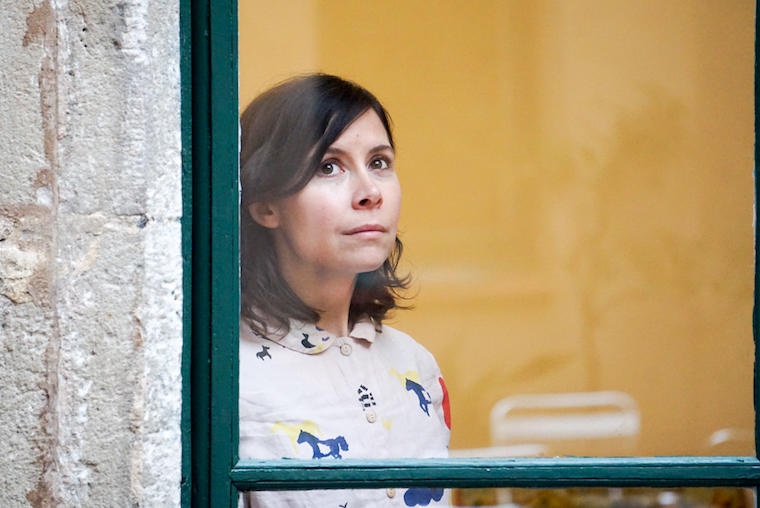Search
To search for an exact match, type the word or phrase you want in quotation marks.
A*DESK has been offering since 2002 contents about criticism and contemporary art. A*DESK has become consolidated thanks to all those who have believed in the project, all those who have followed us, debating, participating and collaborating. Many people have collaborated with A*DESK, and continue to do so. Their efforts, knowledge and belief in the project are what make it grow internationally. At A*DESK we have also generated work for over one hundred professionals in culture, from small collaborations with reviews and classes, to more prolonged and intense collaborations.
At A*DESK we believe in the need for free and universal access to culture and knowledge. We want to carry on being independent, remaining open to more ideas and opinions. If you believe in A*DESK, we need your backing to be able to continue. You can now participate in the project by supporting it. You can choose how much you want to contribute to the project.
You can decide how much you want to bring to the project.

The time we spend sleeping is a period of rest and inaction, a time slot of the day (perhaps the only one), in which we are neither productive nor consumers of products and services. The incessant rhythm of the late capitalist society seems to demand that we keep ourselves active for as long as possible; but paradoxically, in order to be able to do so we need this refreshing sleep daily.
The paradigm of permanent connectivity and the monetization of our activity in the social media has dissolved the already unclear distinction between our time of leisure and rest and the time dedicated to production and consumption. The dynamics of social promotion and economic reward seem to benefit individuals who show a greater willingness and ability to remain as long as possible awake, available, working and interacting in the social media. In the search for the difficult balance between, on the one hand, the time of rest that our organism needs and, on the other hand, the hours of productivity that we need to face this incessant demand of activity, the stimulants, the substances that we ingest to increase the capacity of attention and the level of energy of our organisms, play an important role
My proposal as editor of this month of October to A*Desk continues in a way the reflection initiated in a previous editorial, that of January 2019, when I was guest editor on this platform for the first time. On that occasion I asked four agents from the field of visual arts, cinema and philosophy to think about the forms of organization and social regulation of time, and also about how these questions have been approached from the perspective of artistic practice. This time I invited a group of curators and artists to reflect on the relationship between stimulants, hyperproductivity and the reduction of rest time from the perspective of 24/7 culture.
The editorial month opened with the introductory essay Stimulants, circulation and euphoria, by Oier Etxeberria, in which this artist and curator analyzed the concept of stimulants, and explained how some of the main drivers of modernity were compulsive consumers of substances such as coffee, sugar or tobacco. Etxeberria outlined the relationships between metabolism, thought, production and economy, and towards the end of his article he posed these reflections in the form of questions: “Wasn’t coffee the gasoline of the new bourgeois spirit that emerged in the Enlightenment era? Is it possible to unleash the massive industrialization of a stimulant like sugar and the caloric need of the nascent working class in 18th century England? Is not the massive consumption of tranquilizers a sign of a society that has intensified in excess the productive gesture of the worker?”.
In the article Stealing our Time, Claudia Elies reflected from a historical and theoretical perspective on the introduction of productivist parameters in night time, and on the consequent involution of the hours of rest and sleep. Among other interesting issues, Elies contrasted the homogeneous temporality of our productive present with the temporal regulation of the Middle Ages: “In this perfectly normative medieval world, there were numerous citizen regulations that stipulated the end of the working day at sunset and prohibited, at the same time, night work”. Elies analyzed a selection of specific works by artists such as Cristina Garrido, Iratxe Jaio + Klaas van Gorkum, Mario Santamaría and Josep Fonti that addressed issues such as fatigue, the relationship between sleep, work and connectivity or the introduction of performance and monitoring dynamics in leisure time.
The curatorial platform La Cocina, founded by Alejandro Ramírez and Lore Gablier and based in Amsterdam, used the title of Roberto Bolaño’s poem “Ni crudo ni cocido” (Neither raw nor cooked) to reflect on the notion of consumption and the act of consuming, and on its unfailing reverse, that of being consumed: “As if the act of consuming were a threat against a supposedly defunct self”. The authors also reminded us that, “to consume is to complete a transaction, an exchange: to change and be changed”. La Cocina related this paradoxical dynamic, in which the urge to live is what simultaneously leads to one’s own destruction, to the figure of the cannibal, this anthropophagic liminal being, who in order to survive devours his own kind and therefore – in a figurative sense – also eats himself.
“Queremos tus comentarios. Tell us a little about yourself. ¿Estás pensando en hablar conmigo? Parlem? ¿Tomamos un café? Contact our experienced team. Siempre a tu lado. Disponibles 24/7. Respondrem la vostra consulta al més aviat possible. ¿Any questions? Get in touch”. While the physical headquarters of service companies and commercial premises are regulated by opening and closing hours, on the Internet there is a continuous and homogeneous time, unlinked to the day and night cycles. This encourages the paradigm of permanent availability, the convenience of always being prepared and attentive to a demand for service, a doubt, a complaint, a purchase. This continuous availability is particularly evident in the contact sections of many websites, especially those that are addressed to a customer and/or consumer profile. To close the month of October and this editorial on stimulants, insomnia and hyperproductivity, Mario Santamaría made an artistic intervention on the contact page of the A*Desk website, from which, in a kind of Internet drift, he walked us through dozens of contact sections of Internet pages, telling us of promises of absolute availability, willingness to attend to us as soon as possible.
Perhaps we should think about how available we are, and how quickly we want to respond to the constant demands that are presented to us; about how many hours of sleep and rest we can do without, about how many stimulants our tired bodies need to continue being productive. Meanwhile, sleep is a limit, and insomnia is perhaps the symptomatology of the exhausted person’s discomfort, in this world that demands that we stay always awake.

Alexandra Laudo is an independent curator. In her projects she has explored, among others, issues related to narrative, text and the spaces of insertion between the visual arts and literature; the cultural history of the gaze; practices of resistance to the image in response to hypervisuality and oculocentrism developed from the visual arts and curatorship; and the 24/7 paradigm in relation to sleep, new technologies and the consumption of esimulants. Laudo has explored the possibility of introducing orality, peformativity and narration in the curatorial practice itself, through hybrid curatorial projects, such as performative lectures or curatorial proposals located between literary essay, criticism and curatorship.
Photo: Foto: © Ernest Gual
"A desk is a dangerous place from which to watch the world" (John Le Carré)